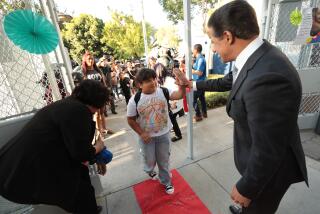L.A. study affirms benefits of preschool
- Share via
Children enrolled in Los Angeles Universal Preschool programs made significant improvements in the social and emotional skills needed to do well in kindergarten, according to a study released Monday. The gains were especially pronounced for English language learners, the study showed.
The findings confirmed observations of preschool teachers that children attending high-quality programs are better prepared for kindergarten. For the first time, the study provided data to back up those observations, officials with the nonprofit preschool organization said.
“This is unique because there’s very little research in terms of cognitive progression in the preschool years,” said Celia C. Ayala, chief operating officer for Los Angeles Universal Preschool. “We know there are differences, we see the differences, but this gives us a way to assess improvements.”
The Los Angeles Universal Preschool is an independent organization funded primarily by a voter-approved tobacco tax and launched in 2005 to provide preschool to 4-year-olds in Los Angeles County. It serves about 10,000 children in 325 preschools.
The study, commissioned by the organization and conducted by the San-Jose-based Applied Survey Research, measured the readiness skills of 437 children at 24 preschools in the fall of 2008 and reassessed 364 of those children in sping 2009.
Skills that were assessed included proficiency in using crayons, washing hands, controlling impulses, expressing needs, counting to 10 and recognizing letters of the alphabet as well as shapes and colors.
The study found that the percentage of children scoring near proficient on all behaviors increased from 22% in the fall to 72% in the spring. English learners who scored significantly lower than their non-English learner peers in fall 2008 had closed the gap in most measures by the spring. In general skills, such as writing their first names, recognizing rhyming words and using books, their gains exceeded those made by non-English learners.
Julia Love, a research and evaluation specialist for Los Angeles Universal Preschool, said the improvements could be due to a number of factors including better communication between student and teacher throughout the school year and parent education.
The same assessment tool used in the study is now being used by all of the organization’s providers to measure children’s progress, Love said.
Joy Cyprian, who operates Joy’s Kids Clubhouse in La Puente, said that because of the tool, she is better able to gauge children’s strengths and weaknesses.
“When children come into my program, most of the time it’s their first experience in any kind of preschool setting and they’re still clinging to mom,” said Cyprian. “If they’re not prepared, they’ll fall behind. But by the time they leave, I see an independent child. They’re not afraid to learn.”
More to Read
Sign up for Essential California
The most important California stories and recommendations in your inbox every morning.
You may occasionally receive promotional content from the Los Angeles Times.














